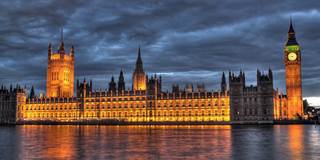Democratic elections cannot be described as competitions aimed at revealing which candidates can tell the unvarnished truth. But this year the British electorate is being asked to believe three great falsehoods, each one of them dangerous in its own way.
LONDON – Democratic elections cannot be described as competitions aimed at revealing which candidates tell the unvarnished truth. Most politicians try to avoid telling outright lies; they bob and weave like prizefighters when faced with questions that might ensnare them in outright mendacity. But they invariably exaggerate what they have to offer, as well as the perils that would result should their opponents win.
It is understandable that politicians should talk up their own vision of the future and talk down what others have to say. All of this is most credible if it does not go too far, and if it bears some resemblance to what the same politicians have achieved when they have been in power. Voters normally spot political Pinocchios and the lengthening of politicians’ noses a mile off. But they also do not expect their elected representatives to be saints. They are prepared to give some the benefit of the doubt (by far the most important attribute any political leader can possess). My guess is that on polling day, Prime Minister David Cameron will emerge holding this asset.
Voters also have a gut instinct – usually, though not always, correct – that parties of the traditional left will tax and spend more, and that those of the right will do the opposite. The way voters respond reflects the way they perceive recent history and what they want for themselves and their families in the future. I subscribe to the view that they normally get these judgments right.

LONDON – Democratic elections cannot be described as competitions aimed at revealing which candidates tell the unvarnished truth. Most politicians try to avoid telling outright lies; they bob and weave like prizefighters when faced with questions that might ensnare them in outright mendacity. But they invariably exaggerate what they have to offer, as well as the perils that would result should their opponents win.
It is understandable that politicians should talk up their own vision of the future and talk down what others have to say. All of this is most credible if it does not go too far, and if it bears some resemblance to what the same politicians have achieved when they have been in power. Voters normally spot political Pinocchios and the lengthening of politicians’ noses a mile off. But they also do not expect their elected representatives to be saints. They are prepared to give some the benefit of the doubt (by far the most important attribute any political leader can possess). My guess is that on polling day, Prime Minister David Cameron will emerge holding this asset.
Voters also have a gut instinct – usually, though not always, correct – that parties of the traditional left will tax and spend more, and that those of the right will do the opposite. The way voters respond reflects the way they perceive recent history and what they want for themselves and their families in the future. I subscribe to the view that they normally get these judgments right.